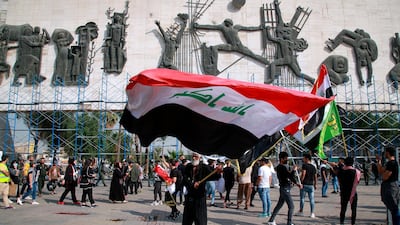Iraq’s flawed justice system requires an intervention by the international community to punish officials involved in human rights abuses and violations, experts said on Tuesday.
Nationwide anti-government protests, which erupted last year, resulted in the killing, arrests and forced disappearances of hundreds of people whose families are still waiting for news of their fate.
“There are people who are in authority today in Iraq who are known by name, and it is very well-known that they played a role in participating and orchestrating the violence against people,” Zaid Al Ali, a senior adviser on constitution building at International Idea said during a Chatham House web seminar.
“There is no accountability for specific individuals in the country, they can do whatever they want, they’ve lost their values,” he said.
“The Iraqi justice cannot hold these people accountable," he continued, adding that the international community must take action by at least freezing their accounts and funds.
Since the start of the protest movement, demonstrators have insisted they will not leave the streets until their demands are met. These include the establishment of a new government that is independent from foreign influence, government institutions that are funded internally and implement just laws, accountability for criminal acts within the government and the end of foreign militias in Iraq.
"If you had been in Baghdad speaking to the leaders of the state while those poor people were being killed on the streets or shot in the face with gas canisters, you'd be shocked to know that they didn't believe that there was anything to be fixed,” Mr Al Ali said.
“People in government think that everything is fine and that actually people who are protesting have nothing to complain about. That's how things happen in Baghdad. There's a huge disconnect,” he said.
The country’s court system is known to be profoundly corrupt, with judges often accepting bribes to ignore evidence or sway verdicts, making Iraq one of the world's 20 most corrupt countries, according to Transparency International.
“The justice system in Iraq is lost completely," said Ahlam Al Lami, an Iraqi lawyer and former president of the Iraqi Bar Association said.
"There are many entities that detain people, and this is one of the main reasons why the justice system is being distorted."
One of the most pressing issues is the need to establish an “accountable entity that is in charge of those who should be detained,” she said.
When a person is detained, their families often have no idea where to look or who to contact – the person will literally be lost, Ms Al Lami said.
They could be held by Baghdad security operations, the justice sector or armed militias that fall under the umbrella of the Popular Mobilisation Forces.
Belkis Wille, senior crisis and conflict researcher for Human Rights Watch, said there are Popular Mobilisation Force judges who have brought people detained [by the PMF] "to prosecute them, mostly on terrorism charges" despite the fact that "the PMF have no legal mandate to be detaining."
Judges who work according to the law are punished, she said, although they have an “incredibly high-level of professionalism and don't lack an understanding of human rights.”
“But the functions of Iraq's courts are impeded by political interference,” she said.
As a result, the system cannot guarantee that victims of violence will ever be able to seek justice for their suffering.


